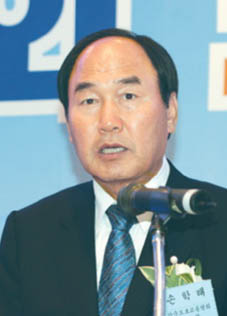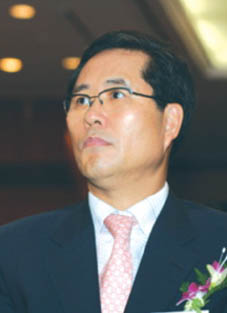'Focus on Human-Oriented
Road Construction'
15th anniversary of Road Day observed with 500 people attending
 Minister of Construction and Transportation Choo Byung-jik called for human-oriented road construction with an emphasis on the environment and lives.
Minister of Construction and Transportation Choo Byung-jik called for human-oriented road construction with an emphasis on the environment and lives.
MOCT Minister Choo gave words of encouragement to the people in the transportation and construction industry for their contributions to the development of the industry, while urging on them to give a more weight on such aspects as the environment and human beings during a ceremony marking the 15th anniversary of Road Day held at Seoul Kyoyukmunhwahoekwan in Yangjae-dong, Seoul, on July 7.
About 500 people from the construction industry and other representatives from several walks of life, including Son Hak-lai, chairman of Korean Road and Transportation Association, were on hand at the ceremony.
In celebration of the July 7, 1970 opening of the Gyeongbu (Seoul-Busan) Line, Road Day has been observed since 1992 with a goal of publicizing the role of roads that have an impact to the national economy and public lives and spreading social consensus on roads.
 Korea Highway Corp. President Son said his corporation is weighing in on exploring the future growth engines that will propel the corporation's strides. "Currently, toll charges account for 95 percent of the corporation's total revenues, and the corporation aims to raise the portion of the revenues arising from the exploration of future growth engines to 10 percent by 2013,"said he said. "The corporation plans to aggressively push ahead with such projects related to such areas as the development of road space through utilization of road assets, logistics and overseas projects that have a potential of taking profits in a bid to cut back on the burden of toll charges to motorists.
Korea Highway Corp. President Son said his corporation is weighing in on exploring the future growth engines that will propel the corporation's strides. "Currently, toll charges account for 95 percent of the corporation's total revenues, and the corporation aims to raise the portion of the revenues arising from the exploration of future growth engines to 10 percent by 2013,"said he said. "The corporation plans to aggressively push ahead with such projects related to such areas as the development of road space through utilization of road assets, logistics and overseas projects that have a potential of taking profits in a bid to cut back on the burden of toll charges to motorists.
Korea Highway Corp. President Son said his staff members make all-out efforts to make sure the smooth passage by vehicles of expressways. Each High-Pass tollgate now handles 1,800 vehicles per hour, more than four times as much as 450 vehicles on previous days, contributing much to relieving traffic congestion.
Korea Highway Corp.
 has expanded projects designed to share on-line integrated transportation information, saying that thanks to the Internet transportation information sharing system, traffic flow turned out to be less severe during this past Lunar New Year holiday season that was shorter than the previous year. He and his corporation plans to raise the number of High-Pass tollgates to 45 lanes in 17 tollgate stations and have all tollgate stations furnished with High-Pass systems by the second half of next year, saying that the key to the success was the application of IT technologies for the purpose of management innovation
has expanded projects designed to share on-line integrated transportation information, saying that thanks to the Internet transportation information sharing system, traffic flow turned out to be less severe during this past Lunar New Year holiday season that was shorter than the previous year. He and his corporation plans to raise the number of High-Pass tollgates to 45 lanes in 17 tollgate stations and have all tollgate stations furnished with High-Pass systems by the second half of next year, saying that the key to the success was the application of IT technologies for the purpose of management innovation
It was last year marking the 14th anniversary of Road Day that Korean Road and Transportation Association held bigger-than-usual, diverse events, The 14th anniversary events included the 1st International Road & Traffic Expo 2005, the 1st International Road & Traffic Conference, the 7th Joint Technical Conference 2005, the Policy Debate on Road and Transportation, the International Parking Symposium and a photo exhibition.
 The previous anniversary events were held in a plain manner with a small number of participants.
The previous anniversary events were held in a plain manner with a small number of participants.
The 1st International Road & Traffic Expo 2005 was held at the fourth and fifth exhibition hall of KINTEX in Ilsan on July 7 through July 10. A total of 174 firms from Korea and abroad participated in the exhibition, held under the theme "dvanced Technology and Safety on the Road."The exhibition provided an opportunity for people of the relevant local industry to take a look at the technology developments and for relevant equipment and technology firms to publicize their advanced materials and equipment. The expo also aimed at expanding the export foundation of the local industry by introducing Korea's out-of-the-state road and transportation technologies to invited guests and buyers.
Take a look at the past and the present of the Geyongbu Line on the occasion of the 36th anniversary of opening Korea's first expressway the 15th anniversary of Road Day.
The Gyeongin Expressway, a 29.5 km-long line between Seoul and Incheon, and the 45.5 km-long Seoul-Osan section of the Gyeongbu Line were opened to traffic in December 1968 after the two broke ground on March 24, 1967 and Feb.1, 1968, respectively. The opening of the expressway sections ushered in the nation's full-fledged expressway era. The Seoul-Osan section of the Gyeongbu Line and the Suwon-Osan portion opened on Dec. 21, 1968 and on Dec. 29, 1968, respectively. The following year, the Osan-Cheon, Cheonan-Daejeon and Daegu-Busan sections were dedicated one after another. In particular, the thorniest portion between Daejeon and Daegu, the last of the Gyeongbu Line, finally opened to traffic on July 7, 1970 to complete the historic construction of Korea's first expressway. A combined 8,928,000 man-days and 1.65 million pieces of construction equipment were put into the construction of the 428 km-long expressway.
Korea had 457.5 km in combined length of expressways -428 km-long Gyeongbu Line and 29.5 km-long Gyeongin Line - and had traffic volumes of an average of 8,000 vehicles per day at the time of opening the Gyeongbu Line. Thirty six years later, the nation has now expressways measuring 2,850 km in total length and traffic volumes of an average of 3.1 million vehicles per day.
Korea was too poor to carry out the Gyeongbu Line project as it earned $168 in per capita GNP in 1968 when the project broke ground. However, the nation has made economic strides with the per capita GNP soaring to $14,000 in 2006, an 86-fold jump over 1968.
As time passes, express construction costs have dramatically swollen. It cost 100 million won per km in completing the Gyeongbu Line in 1969, while the comparable construction cost surged to 2.9 billion won for the Jungbu Line and to a whopping 35 billion won for Seoul Ring Road.
The Gyeongbu Line, a driving force behind Korea's economic development, dubbed the so-called Han River Miracle, has brought about economic benefits estimated at 13.5 trillion won per annum. nw
MOCT Minister Choo Byung-jik
A scene from a ceremony marking the 15th anniversary of Road Day held at Seoul Kyoyukmunhwahoekwan in Yangjae-dong, Seoul, on July 7.
Son Hak-lai, chairman of Korean Road and Transportation Association
Nam In-hee, assistant minister of the Headquarters for Infrastructure at the MOCT
3Fl, 292-47, Shindang 6-dong, Chung-gu, Seoul, Korea 100-456
Tel : 82-2-2235-6114 / Fax : 82-2-2235-0799